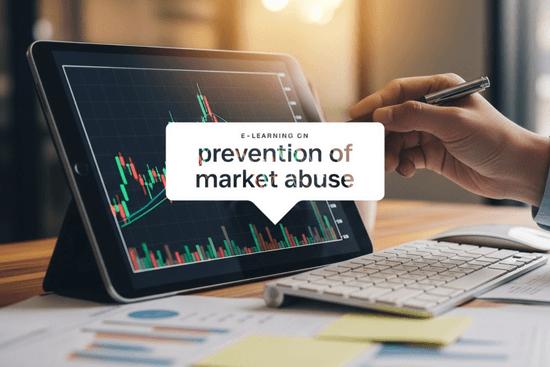In today’s highly regulated and reputation-driven business environment, market abuse is a growing concern for Indian corporates. With increased scrutiny from the Securities and Exchange Board of India (SEBI), companies are under pressure to not just prevent insider trading and market manipulation—but to demonstrate that they are actively educating and empowering their employees to do the same.
This is where e-learning becomes a powerful ally.
What Is Market Abuse?
Market abuse includes a range of unethical or illegal practices that undermine the fairness and transparency of financial markets. In India, the most common forms include:
-
Insider Trading: Using unpublished price-sensitive information (UPSI) for personal or third-party gains.
-
Market Manipulation: Distorting the prices of securities through false or misleading signals.
-
Front Running: Brokers or traders taking advantage of confidential client information for personal gain.
-
Rumor Mongering: Spreading false news or information to influence market behavior.
While SEBI has laid down stringent regulations, prevention starts within companies—especially those in finance, investment, listed entities, or those dealing with sensitive information.
Why Prevention Through Training Is Critical
Many cases of market abuse stem not from malicious intent, but from lack of awareness or poor understanding of regulations. Employees often don’t realize the legal or ethical boundaries they are crossing until it’s too late.
Traditional Compliance Training Falls Short
In-person workshops, PDFs, or occasional town halls are limited in reach and impact. They lack:
-
Consistency in messaging
-
Engagement and interactivity
-
Regular updates with changing laws
-
Scalability across departments and locations
How E-Learning Makes a Difference
E-learning on prevention of market abuse offers a scalable, engaging, and results-driven approach to training employees on complex compliance topics like market abuse. Here’s how it helps:
1. Consistent and Customizable Content
E-learning courses on prevention of market abuse can be tailored to your company’s specific policies and aligned with SEBI’s regulations, ensuring that every employee gets accurate and legally relevant training.
2. Real-Life Scenarios and Simulations
Modern e-learning goes beyond theory. It uses case studies, decision trees, and “what would you do?” scenarios to help employees recognize risky situations before they escalate.
3. On-Demand Accessibility
Whether employees are working from home, in the office, or across geographies, they can access the training at their convenience—ensuring 100% coverage.
4. Trackable and Audit-Ready
E-learning platforms offer dashboards to track participation, quiz scores, and completion rates—helping compliance teams prove due diligence during audits or regulatory reviews.
5. Continuous Learning Culture
Unlike one-time sessions, e-learning encourages periodic refreshers, reminders, and microlearning modules—making compliance a continuous part of your workplace culture.
Key Topics in an E-Learning on Prevention of Market Abuse Should Cover
-
What is market abuse?
-
Understanding UPSI and trading windows
-
SEBI regulations on PIT and market manipulation
-
Common grey areas and ethical dilemmas
-
Reporting suspicious activities
-
Consequences of violations for individuals and organizations
As India’s regulatory environment tightens and reputational risks grow, the smartest companies aren’t just reacting—they’re preparing.
Investing in an e-learning on prevention of market abuse on market abuse is a proactive, cost-effective, and scalable way to build a compliant, ethical workforce.
Want to prevent market abuse before it happens?
Explore our expert-designed, SEBI-aligned e-learning module created for Indian corporates.
continue reading




